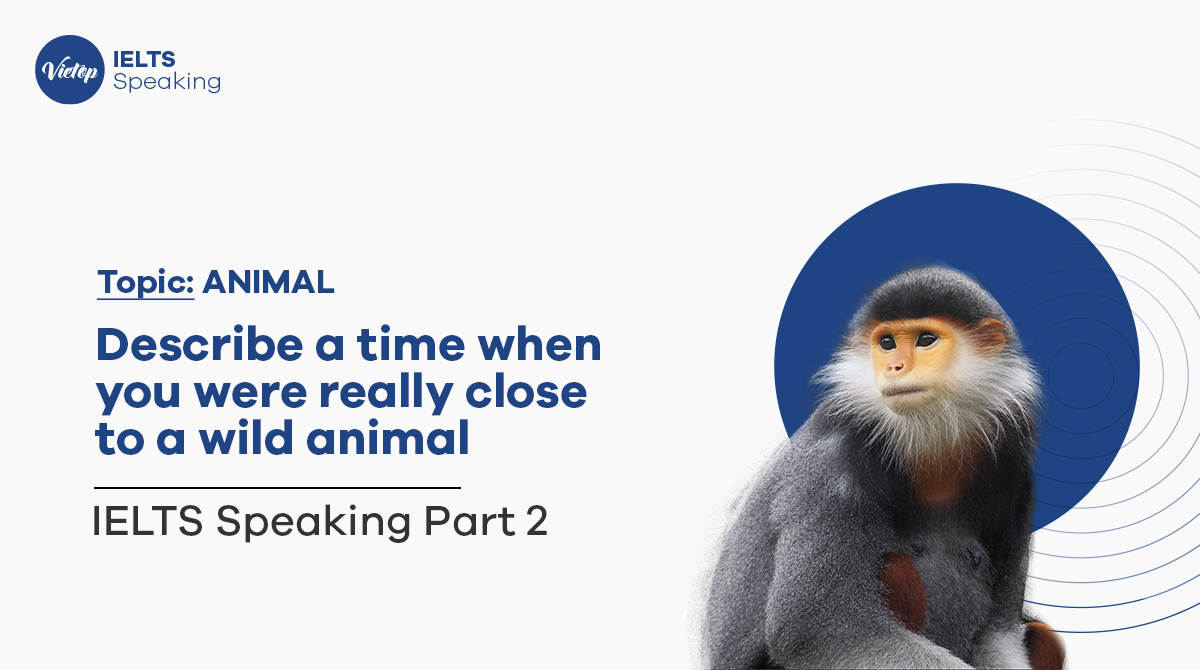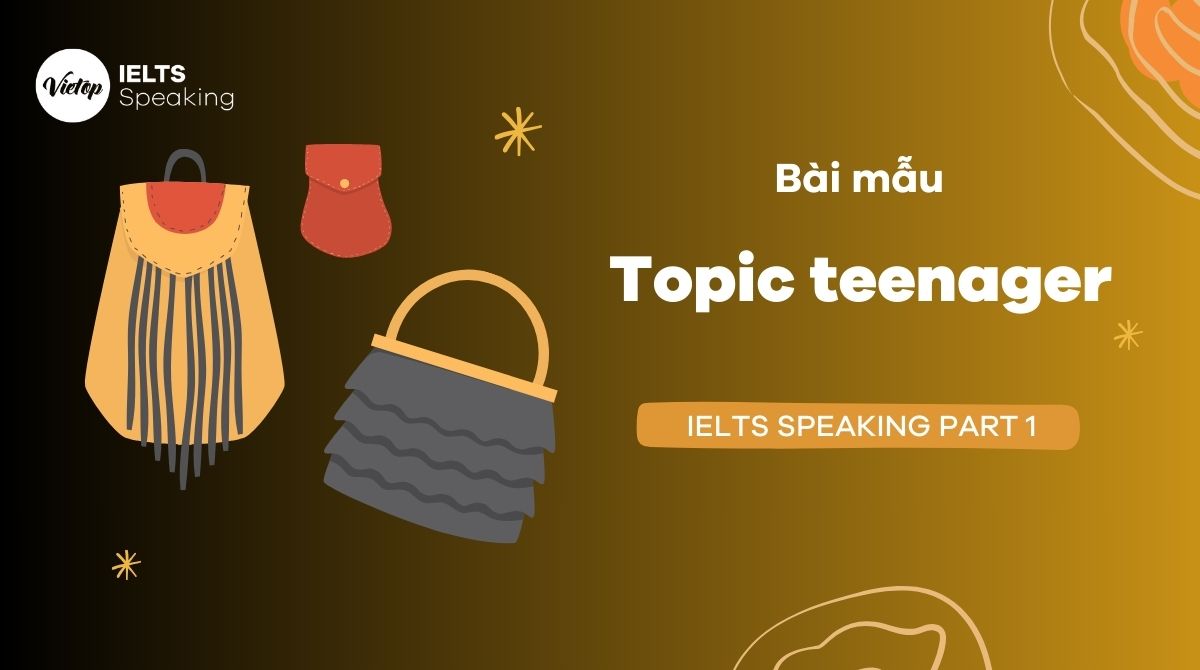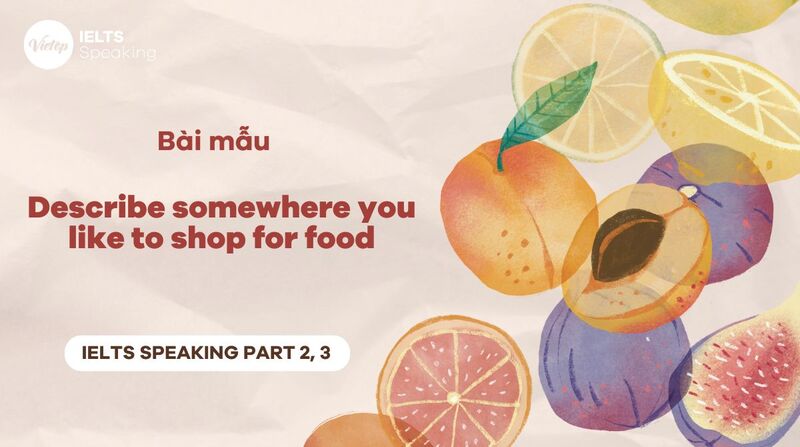Trích dẫn từ đề thi thật IELTS Speaking ngày 20.3.2021, cùng xem Vietop trả lời cho câu hỏi Describe a time when you got close to wild animals như thế nào nhé!
1. Describe a time when you got close to wild animals – IELTS Speaking part 2
| Describe a time when you were really close to a wild animal. You should say What it looked like Where you saw it What it likes to eat or do Why you like it |
Các bạn nghe tại đây nhé:
Xem thêm: Khóa học IELTS Online – Luyện thi IELTS 6.5+ cùng chuyên gia IELTS 8.5

Sample 1
I would like to talk about my experience seeing the red-shanked douc langur in a wildlife rescue center. Two years ago, my classmates and I were on a school trip when we visited Cúc Phương national park in Ninh Bình province. There, we went to EPRC, which stands for Endangered Primate Rescue Center to learn more about Vietnam’s wildlife.
I was walking around the center as a family of colourful-looking monkeys caught my attention. The tour guide informed us that their names were “red-shanked douc langur” due to the reddish color of their legs. Apart from that, their faces were bright orange and their torsos and arms had three colors in the order of black, grey and white from the top down.
Their tails were about 1.5 meter long and coated in white fur. They were housed in a large enclosure with wooden beams so they could move around freely. Our visit coincided with their feeding time so we got to see them being fed. Their diet comprised mostly fresh leaves collected by the keepers and some fruit. They seemed to be joyous having their meal.
However, I also learnt that the reality of their survival was grim. As a species, they’re critically endangered and most of the langurs at the center were rescued from illegal wildlife trade markets or turned in after being raised as pets. Luckily, there had been efforts to save them from the brink of extinction. I was so enthralled by their majestic beauty and I promised myself that day I would spread awareness about their protection whenever I could.
Tham khảo:
- Describe an important historical event
- Bài mẫu Describe a person you wanted to be similar to when you were young
- Describe a popular product made in your region
- Describe a time when you had a problem with a piece of equipment
Vocabulary:
- Rescue center: trung tâm cứu hộ
- Primate (n): động vật linh trưởng
- To inform (v): cho biết
- Reddish (adj): có màu hơi đỏ
- From the top down: từ trên xuống dưới
- Fur (n): lông thú. khác với
- Feather (lông vũ)
- Beam (n): khúc.
- Wooden beam: khúc cây gỗ
- Joyous (adj): sung sướng
- Endangered (adj): bị đe dọa. critically endangered: bị đe dọa nguy cấp (về số lượng).
- To turn in (expression): giao nộp
- The brink of extinction (expression): bờ tuyệt chủng
- Enthralled (adj): bị mê hoặc
- Majestic (adj): lộng lẫy, oai nghiêm
- Awareness (n): nhận thức
Sample 2
Mời bạn cùng nghe Podcast bài mẫu Part 2 của Vietop English nhé:
I’d like to recount an instance when I had a remarkable encounter with wildlife. It happened during a camping trip in a remote natural reserve. As we ventured deeper into the wilderness, we unexpectedly found ourselves in close proximity to untamed creatures.
While on a nature hike, I stumbled upon a family of deer grazing peacefully in a meadow. The proximity between us and these graceful animals was truly astonishing. They seemed undisturbed by our presence, which allowed for an unforgettable connection with the natural world.
My heart raced with excitement as I cautiously observed these magnificent creatures from a respectful distance. I could hear the rustling of leaves, the gentle chirping of birds, and even the soft munching of grass as the deer continued their tranquil meal. It was a serene and almost surreal moment, a stark contrast to the hustle and bustle of everyday life.
As I watched them go about their business, I was reminded of the importance of preserving these pristine habitats for the sake of these magnificent animals. The experience left me with a profound appreciation for the wonders of the natural world and a lasting memory of the day I got up close and personal with wild animals.
Vocabulary:
- Recount: kể lại
- Remarkable encounter: cuộc gặp gỡ đáng chú ý
- Ventured: mạo hiểm
- Proximity: sự gần gũi
- Stumbled: vấp ngã
- Unforgettable: không thể nào quên
- Magnificent: tráng lệ
Luyện tập IELTS Speaking với các bài mẫu IELTS Speaking part 1, IELTS Speaking part 2 và IELTS Speaking part 3 dưới đây:
- Bài mẫu topic Morning time – IELTS Speaking part 1
- Bài mẫu topic work and study IELTS Speaking part 1
- Bài mẫu topic Environment IELTS Speaking Part 1, 2, 3
2. Sample Speaking part 3: Wild Animals

Mời bạn cùng nghe Podcast bài mẫu Part 3 của Vietop English nhé:
2.1. Besides the animal you just spoke about, what other wild animals are there in your country or around where you live?
The fauna of Vietnam is very diverse. With its diverse ecosystems, which range from the evergreen rainforests from north to south, it is a hotspot for biodiversity. The majority of Vietnam’s wild animals are safeguarded by the country’s various national parks and wildlife refuges. Lions, Bengal tigers, leopards, black bears, blackbucks, camels, and elephants are examples of wild creatures.
- Fauna (n): động vật
- Diverse (adj): đa dạng
- Ecosystem (n): hệ sinh thái
- Evergreen rainforest (n): Rừng nhiệt đới thường xanh
- Hotspot (n): điểm nóng
- Biodiversity (n): đa dạng sinh học
- Safeguard (v): bảo vệ
- Wildlife refuge: Nơi ẩn náu của động vật hoang dã
- Leopard (n): báo
- Blackbuck (n): sơn dương đen
- Camel (n): lạc đà
- Wild creatures (n): sinh vật hoang dã
2.2. In general, how do people in your country feel about wild animals?
People behave differently from one another, and as a result, so do their feelings. Adventure-seeking individuals adore spending time with animals. Zoos are places they go to watch wild animals. On the other hand, some people dislike seeing or being around wild animals because they are afraid of them.
- Adventure-seeking (adj): phiêu lưu mạo hiểm
2.3. In general, what is the attitude of people in your country towards wild animals?
Various people have different perspectives on wild animals. Some people fear them, while others worship them, while others simply like them and visit zoos to view them. Some people even kill wild animals to harvest their organs.
- Perspective (n): góc nhìn
- Worship (v): thờ cúng
- Harvest (v): thu hoạch
- Organs (n): nội tạng
Bạn đang ấp ủ trong mình ước mơ đi du học nước ngoài, những không biết bắt đầu học tiếng anh từ đâu. Hãy để Vietop mách cho bạn cách dễ dàng chinh phục ước mơ của bản thân. Để hoàn thành ước mơ nhanh chóng thì trước tiên bạn cần làm được các dạng bài IELTS Speaking part 2, 3 với chủ đề Describe a time when you got close to wild animals. Với khóa học IELTS 7.0 tại Vietop English.
Sau khi kết thúc khoá học bạn sẽ hoàn toàn tự tin chinh phục mọi dạng câu hỏi và kỹ năng làm bài yêu cầu, có khả năng vận dụng linh hoạt từ vựng và ngữ pháp nâng cao giúp bạn tự tin trả lời các câu hỏi về mọi chủ đề một cách thông thạo và ấn tượng, có khả năng linh hoạt trong việc sử dụng từ vựng và ngữ pháp sẽ giúp bạn tự tin chinh phục mọi câu hỏi với sự thông thạo và ấn tượng, để lại dấu ấn sâu sắc trong mắt người nghe. Đừng bỏ lỡ ước mơ của bản thân khi đã quá muộn, hãy luyện thi IELTS cho bản thân để đạt được mục tiêu IELTS 7.0. Chần chờ gì nữa, đăng ký khoá học ngay để đạt được ước mơ của bản thân sớm nhé!
2.4. Do you like wild animals? Why?/Why not?
Yes, I enjoy seeing all wildlife from a distance. I adore watching documentaries on wild animals on the Discovery Channel and the National Geographic Channel, as well as going to zoos to see them.
- Documentary (n): phim tài liệu
2.5. In general, do you think people like wild animals?
Yes, I think they do. In my opinion, seeing these animals is a wonderful experience. Many animal-related channels that broadcast various wild animal activities and ways of life are currently very popular.
- Broadcast (v): phát sóng
2.6. Are there any wild animals that you dislike? Why?
I enjoy all the wild animals because I appreciate the natural world. There is no escaping the fact that I am afraid of wild creatures, but that does not imply I detest them.
- Imply (v): ngụ ý
- Detest (v): ghét
2.7. What about lions and tigers, do you like them?
Maybe just a little bit. Sometimes they are cute when I watch them from a far distance. However, they do occasionally devour people, after all. Normally, lions and tigers enjoy eating other wild animals like zebras, but they only do it when people provoke them.
- Devour (v): ngấu nghiến
- Provoke (v): khiêu khích
2.8. In your country, are people’s attitudes towards wild animals today the same as people’s attitudes in the past?
The way people view animals has undergone a paradigm shift. A sizable portion of people in this day and age hold the belief that, like people, wild animals are an essential component of our planet.
- Undergo (v): trải qua
- A paradigm shift (n): sự thay đổi định kiến
Xem thêm bài mẫu Speaking chi tiết:
- Topic In Relationship – Bài mẫu IELTS Speaking part 1, 2, 3
- Bài mẫu IELTS Speaking part 1 Topic Writing
- Bài mẫu The area that you live – IELTS Speaking Part 1
- Bài mẫu topic Transportation IELTS Speaking part 1
Còn bạn, đã bao lâu rồi bạn chưa gần gũi với thiên nhiên và các loài động vật hoang dã? Bạn có suy nghĩ gì về việc bảo vệ chúng? Hãy comment để chia sẻ nhé!
Hy vọng bài mẫu về Describe a time when you got close to wild animals đã giúp bạn có nhiều từ vựng và ý tưởng hơn khi ôn luyện IELTS. Chúc bạn luyện IELTS Speaking thật tốt nhé!









